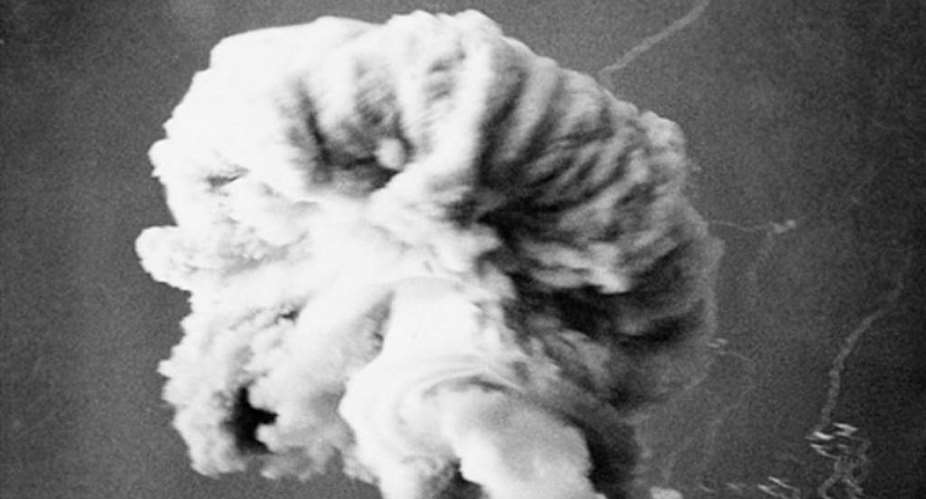Thursday 13 February 2020 marks the 60th anniversary of the first French nuclear tests in Algeria. To be followed-up later in 1960s in French Polynesia, the experiements turned France into one of the world's foremost nuclear powers. But seven decades on, thousands of victims are still waiting for compensation from the French government.
The site chosen for France's first nuclear test, Codenamed "Gerboise Bleu" or "Blue Desert Rat" was the Reganne oasis 700 km south of Colomb Bechar in the Algerian Sahara.
The operation, authorized by then-President General Charles de Gaulle, took place at 0704 GMT on 13 February 1960 and was about four times more powerful than the Hiroshima bomb.
"Hurray for France," de Gaulle wrote at the time.
French authorities continued to use the Reggane site for the next three atmospheric tests, but this soon triggered severe condemnation from other African nations, forcing the government to take its nuclear testing underground.
However, in 1962 further controversy broke out after an underground nuclear blast named "Beryl" dispersed radioactive rock and dust into the atmosphere, which victims say left a legacy of environmental devastation and health problems that linger today.
In 1996, then-President Jacques Chirac called a halt to nuclear testing.
Most experiments took place in French Polynesia. But 17 took place in Algeria between1960 and 1966, ending just four years after Algeria's independence from France.
Activists maintain that testing sites are still contaminated, with many just fenced off by barbed wire, at best.
Waiting for compensation
Altogether, between 27,000 to 60,000 people from communities surrounding the test sites were affected, according to one media report.
France's nuclear compensation commission, CIVEN, said more than 1,600 claims have been filed under a 2010 French law that finally acknowledged health problems linked to the tests.
To qualify, victims need to prove that they have a minimum level of exposure to weapons tests and suffer from one of two dozen possible types of cancer.
Of the 51 claims from Algeria, only one claim has been honoured.
The unresolved fallout of the nuclear explosions has fed into longstanding tensions between Paris and its former colony.
Experts say that Algerians want the French to recognise the crimes committed against them. Numerous Saharan residents today suffer cancers, blindness and birth defects.
In 2017, French President Emmanuel Macron acknowledged that France's colonialisation of Algeria had been a "crime against humanity."





 Ejisu by-election: Aduomi warns NPP against voter intimidation
Ejisu by-election: Aduomi warns NPP against voter intimidation
 High Court orders implicated four NDA officials to present defence
High Court orders implicated four NDA officials to present defence
 Let’s all be matured, patriotic to have a peaceful election this year – Dampare ...
Let’s all be matured, patriotic to have a peaceful election this year – Dampare ...
 Mahama's administration saw thievery that knew no bounds; stole from market wome...
Mahama's administration saw thievery that knew no bounds; stole from market wome...
 GRA/SML deal: Always read the stories behind the headlines or you'd look stupid ...
GRA/SML deal: Always read the stories behind the headlines or you'd look stupid ...
 GRA/SML Contract: It takes some 'wild' boldness for a president to make this dec...
GRA/SML Contract: It takes some 'wild' boldness for a president to make this dec...
 Elisu By-election: "If you call yourself a man, boo Chairman Wontumi again" — Bo...
Elisu By-election: "If you call yourself a man, boo Chairman Wontumi again" — Bo...
 Fuel tanker driver escapes with his life after tanker goes up in flames near Suh...
Fuel tanker driver escapes with his life after tanker goes up in flames near Suh...
 Uniform change: ‘Blue and white are brighter colours’ — Kwasi Kwarteng explains ...
Uniform change: ‘Blue and white are brighter colours’ — Kwasi Kwarteng explains ...
 MoE not changing all public basic school uniforms but only newly built ones — Kw...
MoE not changing all public basic school uniforms but only newly built ones — Kw...
